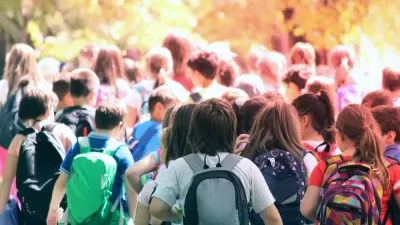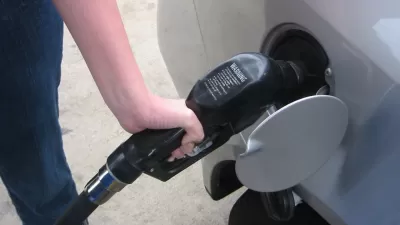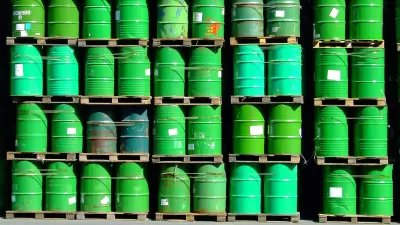The now-famous children's lawsuit, featured on 60 Minutes last Sunday, was not filed against President Trump—he just inherited it from his predecessor. Both administrations have tried to have the case dismissed.

"Of all the cases working their way through the federal court system, none is more interesting or potentially more life-changing than Juliana v. United States," states 60 Minutes correspondent Steve Kroft.
It was filed [pdf] back in 2015 on behalf of a group of kids who are trying to get the courts to block the U.S. government from continuing the use of fossil fuels. They say it's causing climate change, endangering their future and violating their constitutional rights to life, liberty and property.
Planetizen last posted on the case in July after the Ninth U.S. Circuit Court of Appeals in San Francisco rejected the Trump administration’s second attempt to dismiss the case.
"The suit relies on the 'public trust' doctrine, which holds the government responsible for managing natural resources, such as air, land and water, for the benefit of the people," reported Bob Egelko, court reporter for the San Francisco Chronicle.
Its winning streak has largely continued through January.
Kroft interviews lead plaintiff, University of Oregon student Kelsey Juliana, the oldest of the 21 youth plaintiffs, who "were recruited from environmental groups across the country by Julia Olson, an Oregon lawyer, and the executive director of a non-profit legal organization called 'Our Children's Trust.'" Kroft also interviews Olson.
"Why is the federal government responsible for global warming?" Kroft asks Olson. "I mean it doesn't produce any carbon dioxide. How are they causing it?"
Olson: "They're causing it through their actions of subsidizing the fossil fuel energy system, permitting every aspect of our fossil fuel energy system, and by allowing for extraction of fossil fuels from our federal public lands. We are the largest oil and gas producer in the world now because of decisions our federal government has made."
What's interesting in the piece is how the legal system brings truth to the issue of climate change, something the administration refuses to do, yet their lawyers now have been forced to acknowledge scientific findings.
The legal proceedings have required the government to make some startling admissions in court filings. It now acknowledges that human activity - in particular, elevated concentrations of greenhouse gases - is likely to have been the dominant cause of observed warming since the mid-1900s…
Ann Carlson, a professor of environmental law at UCLA, like almost everyone else in the legal community, thought the case was doomed. In response to Kroft's question about the significance of the case, she states:
Well, if the plaintiffs won, it'd be massive, particularly if they won what they're asking for, which is get the federal government out of the business of in any way subsidizing fossil fuels and get them into the business of dramatically curtailing greenhouse gases in order to protect the children who are the plaintiffs in order to create a safe climate. That would be enormous.
Carlson was also cited by
"The next oral arguments in Juliana v. United States are scheduled for June in Portland," notes Kroft. "But whatever happens next will certainly be appealed"
Other children's climate lawsuits
While Juliana v. U.S. has gained national attention, it is one of dozens of lawsuits filed by Our Children's Trust since 2011 "to advance science-based climate recovery action at the state level" in all 50 states. Planetizen noted the dismissal of the Washington state lawsuit, one of nine pending state-level cases involving youth advocates supported by Our Children's Trust, last August in a post on the state's second carbon pricing initiative.
"The state judge wrote that climate change poses urgent threats, but that it should be solved by the executive and legislative branches, not the courts," reported Georgina Gustin for InsideClimate News on Aug. 15.
In his ruling to dismiss the case, Judge Scott urged the young plaintiffs to keep pressure on state lawmakers...For example, he wrote in his order, they could urge state lawmakers to enact policies such as a carbon tax...
Less than three months later, voters dealt climate action a second defeat in the Evergreen State by overwhelmingly defeating the state's second carbon tax initiative in as many years.
Other climate change lawsuit featured in Planetizen:
-
Another Major Climate Win for Big Oil in Federal Court, July 25, 2018A New York federal district court rules on a climate change lawsuit like its West Coast counterpart did last month: Don't hold oil companies accountable for climate change and sea level rise. Baltimore and Rhode Island file climate change lawsuits.
-
Big Oil Wins Climate Change Lawsuits, June 28, 2018The courts are no place to be deciding on the contribution of fossil fuels to climate change, ruled a Northern California federal district court judge in a "stinging defeat" to San Francisco and Oakland that wanted Big Oil to pay mitigation costs.
-
Battle of the Bay: S.F. and Oakland Sue Oil Companies Over Sea Level Rise, September 22, 2017Two California cities are going after oil companies with a legal argument that recalls the legislation against big tobacco companies in the 1990s.
FULL STORY: The climate change lawsuit that could stop the U.S. government from supporting fossil fuels

Planetizen Federal Action Tracker
A weekly monitor of how Trump’s orders and actions are impacting planners and planning in America.

Chicago’s Ghost Rails
Just beneath the surface of the modern city lie the remnants of its expansive early 20th-century streetcar system.

San Antonio and Austin are Fusing Into one Massive Megaregion
The region spanning the two central Texas cities is growing fast, posing challenges for local infrastructure and water supplies.

Since Zion's Shuttles Went Electric “The Smog is Gone”
Visitors to Zion National Park can enjoy the canyon via the nation’s first fully electric park shuttle system.

Trump Distributing DOT Safety Funds at 1/10 Rate of Biden
Funds for Safe Streets and other transportation safety and equity programs are being held up by administrative reviews and conflicts with the Trump administration’s priorities.

German Cities Subsidize Taxis for Women Amid Wave of Violence
Free or low-cost taxi rides can help women navigate cities more safely, but critics say the programs don't address the root causes of violence against women.
Urban Design for Planners 1: Software Tools
This six-course series explores essential urban design concepts using open source software and equips planners with the tools they need to participate fully in the urban design process.
Planning for Universal Design
Learn the tools for implementing Universal Design in planning regulations.
planning NEXT
Appalachian Highlands Housing Partners
Mpact (founded as Rail~Volution)
City of Camden Redevelopment Agency
City of Astoria
City of Portland
City of Laramie





























